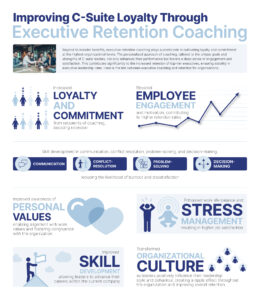Considering an investment in coaching to retain your top talent? Wondering if it’s money well spent?
Eric Schmidt credits much of Google and Apple’s trillion-dollar valuations to their business coach, Bill Campbell In his book, Trillion Dollar Coach: The Leadership Playbook of Silicon Valley’s Bill Campbell, reveals that Bill Campbell, who also mentored Steve Jobs, was Silicon Valley’s best-kept secret. The book highlights the unanimous agreement among interviewees that they “would not have been nearly as successful without that coaching.”
Executive coaching is prevalent among leading companies, with one-third of Fortune 500 firms investing in coaching for their top talent. The demand for coaching on the employee side is also increasing, with 1.5 million searches made every month by people looking for life, business, and executive coaches, according to iPEC.
But what exactly is executive retention coaching? How do executive retention coaches influence C-suite loyalty? And is it worthwhile investing in, as part of your organization’s overall executive retention strategy? Read on to learn how to leverage executive retention coaching to get your top talent to stay.
Understanding Executive Retention Coaching
At its core, executive coaching helps executives reach their aspirations. A skilled coach assists clients in gaining clarity, overcoming challenges, and ultimately attaining personal and professional objectives. Coaching facilitates profound and lasting transformations by encouraging individuals to delve deeper and unlock their potential.
Traditional coaching focuses on clarifying goals and providing motivation and accountability. This process delivers results, but not ones that last.
Where ordinary coaching leaves off, transformative coaching digs deeper into the underlying causes of the challenges. Now, executives are seeking transformational coaching, which helps them become aware of their inner world, driving motivations, and limiting beliefs. Once aware, the individual can shift how they approach and solve their problems. Transformational coaching empowers executives to be the agents of change in their lives.
What Executive Coaching Isn’t
Executive Coaching Isn’t Leadership Coaching
While an executive coach helps build leadership skills, leadership coaching lacks the holistic approach of executive coaching. Leadership coaching is limited to skills like interpersonal skills, communication, decision-making. Also, unlike executive coaching, leadership coaching can be administered at lower organisational levels.
Executive Coaching Isn’t Consulting
Consultants solve business problems, while coaching assists clients in solving their individual problems. Consultants define the problem and formulate solutions. In contrast, coaches don’t provide solutions; they guide clients in finding their own path.
Executive Coaching Isn’t Mentoring
A mentor is chosen because they’ve achieved what the client wants to achieve. The mentee emulates the mentor’s style, footsteps and decisions. The executive coaching process helps individuals discover their unique path, strengths, skills, and blind spots.
Executive Coaching Isn’t Therapy
Executive coaching is not a substitute for a professional mental health therapist. Therapists/psychologists help individuals fix their dysfunctional state and resolve internal conflicts to become fully functional individuals. In contrast, executive coaches work with functional individuals to enhance performance.
Coaching Isn’t A Best Friend
A coach is neutral and follows a trained, standard process, unlike a best friend who may have opinions and an agenda.
What Does Executive Coaching Cover?
Executive coaching helps top management develop their potential. It provides a customized approach tailored to individual goals, strengths, and preferences, ensuring fast and effective results. It’s been proven in multiple studies to positively impact recipients.
A case study focusing on female leaders who underwent coaching revealed improvements in self-awareness, self-confidence, self-leadership, leadership style, and their relationship to power, conflict, and personal life.
In a study by the International Journal of Evidence-Based Coaching and Mentoring, 100% of coachees expressed complete satisfaction with executive coaching, with 75% stating that its value surpassed the money and time invested.
Areas Of Focus:
- Enhanced decision-making and strategic planning
- Leadership in managing change and crisis
- Self-awareness and identification of blind spots
- Increased confidence and self-belief
- Effective team motivation and communication
- Stress and conflict management
- Improved work/life balance
- Successful role transition
- Enhanced focus on big-picture issues
Improving C-Suite Loyalty Through Executive Retention Coaching
Beyond its broader benefits, executive retention coaching plays a pivotal role in cultivating loyalty and commitment at the highest organizational levels. The personalized approach of coaching, tailored to the unique goals and strengths of C-suite leaders, not only enhances their performance but fosters a deep sense of engagement and satisfaction. This, contributes significantly to the increased retention of top-tier executives, ensuring stability in executive leadership roles. Here is the link between executive coaching and retention for organisations:

Creating a Coaching Culture
After providing top executives with personal coaching, the next step is to instill a ‘coaching culture’ in the organisaton. This involves spreading a coaching mindset and practices throughout the organization so it becomes part of the company’s identity. In a coaching culture, people communicate, and give and receive feedback openly, focusing on improvement, learning and growth.
Coach Training For C-Suite Executives
A coaching culture starts with the top leadership modeling coaching behaviours. Thus a coaching culture cascades down the organisation, fostering open communication, collaboration, and employee empowerment. C-suite executives voluntarily seek coach training to engage with their teams, understand aspirations, provide support, and address performance challenges. This not only equips executives to handle organizational issues but also boosts their sense of support, value, and engagement, contributing to higher retention rates.
Summing It Up
In summary, integrating executive coaching into a comprehensive retention strategy is pivotal in cultivating C-suite loyalty. Organizations, that invest in coaching tailored to the goals and strengths of their C-suite leaders, establish a strong link between coaching initiatives and retention outcomes. Therefore, coaching, if strategically interwoven into broader executive retention strategies including cultivating an attractive organisational culture, using executive retention agreements, offering executive retention bonuses and planning successions, emerges as a linchpin for stability in critical leadership roles.
References:
https://www.trilliondollarcoach.com/
https://www.ipeccoaching.com/hubfs/What%20is%20Coaching%20-%20iPEC%20Coach%20Training.pdf
https://radar.brookes.ac.uk/radar/file/2d76c41c-6628-4eed-8a8a-4d0a5c4f5540/1/special11-paper-05.pdf
https://www.researchgate.net/publication/329732077_Organisational_coaching_outcomes_A_comparison_of_a_practitioner_survey_and_key_findings_from_the_literature














